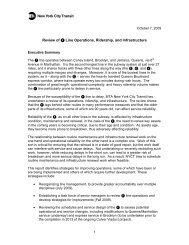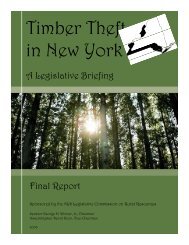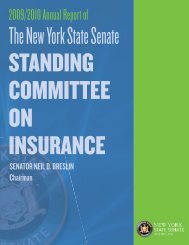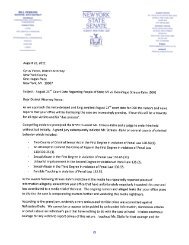Crime Committee Report e.indd - New York State Senate
Crime Committee Report e.indd - New York State Senate
Crime Committee Report e.indd - New York State Senate
Create successful ePaper yourself
Turn your PDF publications into a flip-book with our unique Google optimized e-Paper software.
4. Many states have declined to adopt the federal Adam Walsh Act that would expand community<br />
notification via the state’s Internet registry to include registered offenders who<br />
pose the lowest risk of re-offense; require that anytime affirmative community notification<br />
is undertaken that law enforcement concurrently conduct community education to<br />
ensure that risk is communicated in a way that makes sense; monitor acts of vigilantism<br />
and take action against anyone found to have abused the use of the Internet registry<br />
to harass or harm a registered offender or his family. Community notification has been<br />
found to have no demonstrable impact on sexual recidivism. In fact, some studies suggest<br />
that community notification may aggravate stressors that lead to increased recidivism<br />
32 , and requiring broad community notification via the Internet may discourage<br />
some victims of sexual abuse from reporting incidents to the authorities. Victims may<br />
be reluctant to report offenses out of concern for a perpetrator who is close to them ( a<br />
relative, a step-parent), or out of concern for their own privacy. 33 The Adam Walsh Act<br />
would take <strong>New</strong> <strong>York</strong> in a dangerously opposite direction, besides the fact that experts<br />
agree that it would cost more to implement than the state would stand to lose in federal<br />
grant money.<br />
5. Pass the Healthy Teens Act, 34 a bill pending in both the Assembly and the <strong>Senate</strong>, which<br />
would establish an age-appropriate and medically accurate program of comprehensive<br />
sex education, including instruction on avoiding unwanted verbal, physical and sexual<br />
advances. Each year, <strong>New</strong> <strong>York</strong> adds another restriction on those already convicted of<br />
sex offenses as a means to prevent sexual violence against children. However, the overwhelming<br />
majority (around 95%) of sex offenses, including rape and child molestation,<br />
are committed by those who have never before been convicted of an offense. This means<br />
that <strong>New</strong> <strong>York</strong> concentrates all of its legislative efforts on preventing only 5% of all sex<br />
crimes against children, and completely ignores the threat posed by first-time offenders.<br />
The Healthy Teens Act would provide young people with age-appropriate comprehensive<br />
sex education that would include instruction about how to avoid becoming a victim—perhaps<br />
the most valuable and effective tool way to reduce the incidence of child<br />
sexual assault.<br />
32 Naomi J. Freeman, The Public Safety Impact of Community Notification Laws, <strong>Crime</strong> & Delinquency (2009) (“Empirical research has suggested<br />
that sex offenders do not always commit crimes within their areas of residence and, thus, the areas in which notification occurs. Indeed,<br />
studies in Colorado and Minnesota found that sex offenders are unlikely to offend close to their homes and within the area that notification<br />
occurs; rather, sex offenders may travel, on average, 3 to 5 miles to gain access to victims.”).<br />
33 Jeffrey C. Sandler, Does a Watched Pot Boil? A Time-Series Analysis of <strong>New</strong> <strong>York</strong> <strong>State</strong>’s Sex Offender Registration and Notification Law,<br />
Psychology, Contextualizing Sex Offender Management Legislation and Policy: Evaluating the problem of Latent Consequences in Community<br />
Notification Laws, International Journal of Offender Therapy and Comparative Criminology (2001).<br />
34 Assembly Bill 1806A (Assemblyman Gottfried)/<strong>Senate</strong> Bill 3836 (Senator Duane).<br />
Standing <strong>Committee</strong> on <strong>Crime</strong> Victims, <strong>Crime</strong> and Correction | 2009-2010 <strong>Report</strong> 29









![[PDF] Proposed MTA Capital Program - New York State Senate](https://img.yumpu.com/24854139/1/190x245/pdf-proposed-mta-capital-program-new-york-state-senate.jpg?quality=85)






